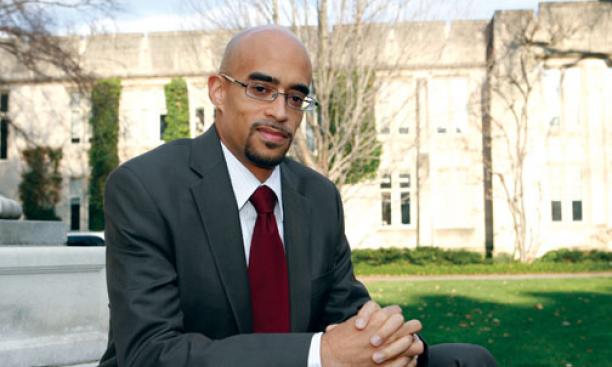

Assistant professor Joshua Guild is a historian specializing in African-American studies. He recently completed a bio-graphical essay on Shirley Chisholm, the first black woman elected to Congress and — in 1972 — the first African-American to make a serious run for the presidency. Guild became interested in Chisholm five years ago, before anyone knew that Barack Obama would justify her belief that someday an African-American would become president. Guild spoke with PAW six days after this momentous Election Day.
What were your feelings at the moment it became clear that Sen. Obama would be our next president?
It was very difficult then, as now, to put it into words. I definitely shed a few quiet tears, but mostly I was just trying to absorb it, to take it all in — as a citizen who’d voted; as someone who’d volunteered in a campaign [to elect a friend to Congress]; but also as a historian who gets paid to think about these things in a bigger context.
Other black candidates, including Shirley Chisholm, have run for the presidency. What changed to make Obama’s election possible?
Each of those candidates built upon the successes and hopefully learned some of the lessons of the ones who went before. I would suggest that Obama ... built on their coalitions in important ways, in terms of the kinds of coalitions they tried to build. Shirley Chisholm, when she ran, tried to bring together young people. The voting age had just been lowered to 18 when she was running. She was opposed to the Vietnam War. And she was perhaps the only candidate running in 1972 who spoke Spanish, so she tried to reach out to Hispanics generally, and of course to African-Americans and women. She was trying to build a broad coalition in a way that Obama also tried to do. He just had a bigger apparatus with which to do it in the age of the Internet.
Does Obama’s election mean we’ve crossed over into a post-racial era, the “Promised Land” that Martin Luther King Jr. prophesied?
No, we’re not at the Promised Land yet. Obama’s election has incredible symbolic significance and resonance, but I think it’s impossible for us to understand fully what that resonance will be. The outpouring of emotion from across the spectrum of American society and internationally — that’s unprecedented. That said, African-Americans are still, by almost all social indicators, disproportionately represented and marginalized. Look at incarceration rates, rates of AIDS, at who’s most likely to be in underperforming, underserved public schools. It’s not going to change today; it’s not going to change on Jan. 20. Obama, his administration, and a progressive bloc in Congress can help move the country to address some of those things, but those are long-term issues that don’t change with his administration.
Will historians look back on Obama’s speech on race as the defining moment in his campaign?
It certainly felt that way at the time. It was a pivotal moment. But what it means for a national conversation about race remains to be seen, in part because once he made that speech, all of the candidates really seemed to veer away from talking about race. It didn’t necessarily open up a conversation. It really, in some ways, foreclosed that conversation. It was wonderfully reflective, very nuanced, very honest in most respects, but it didn’t lead anywhere directly.
Are we expecting too much “change” from Obama‚ change no one could deliver?
Politics is about making choices, and he and his administration are going to have to make choices and set some priorities. His campaign has created an incredible grassroots organization, an incredible network of people. That’s unprecedented. If we take them at their word and if they are as politically astute as they appear to be, they’ll make use of that for things other than fundraising. They’re going to use that network ... as a way of reflecting on and developing policy.
How significant was the skillful way in which the Obama campaign used new technology to mobilize supporters?
In a way, that’s one thing he draws from the civil-rights movement. ... The heart of the process of social change in the 1960s, in the civil-rights movement and the black-freedom movement, was about engaging people at the grassroots level — empowering people at the local level to make decisions about their own futures. That was what Ella Baker did, as one of the key organizers of the Student Nonviolent Coordinating Committee. And in a very different context, that is what the Obama campaign has done: It’s given people the power to talk to their neighbors about their local concerns and try to push them up the ladder to the national level.
Interview conducted and condensed by Merrell Noden ’78
